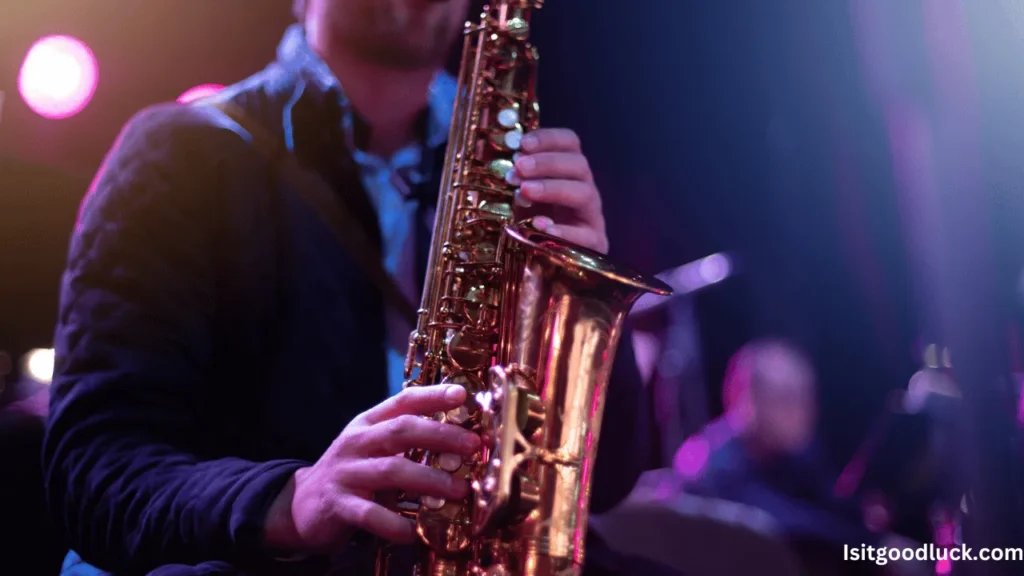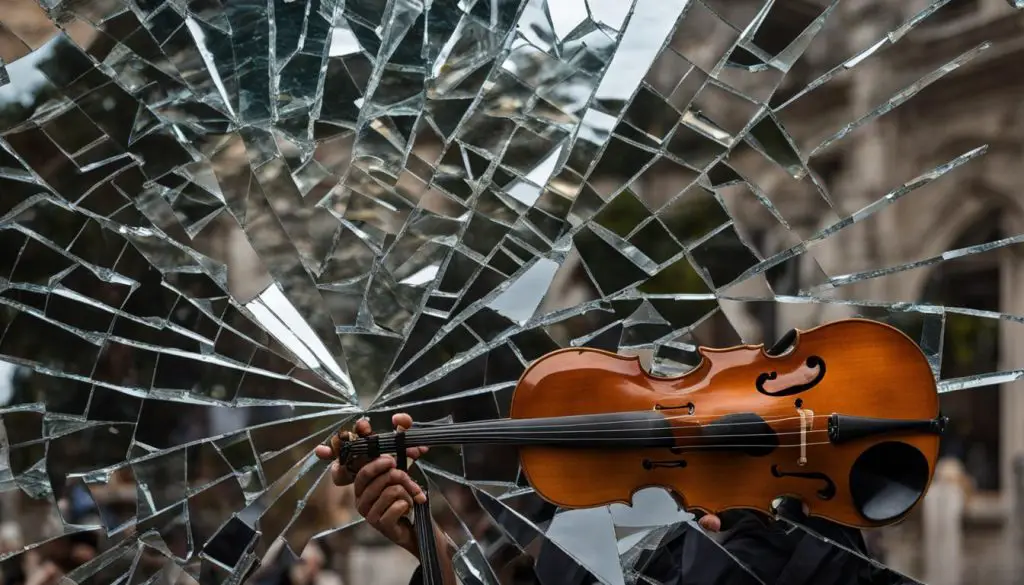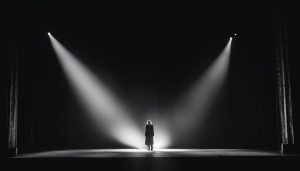In various live art forms, performers believe that it is bad luck when you wish them good luck. This superstition has become a tradition in the performing arts world. Actors are told to “break a leg,” circus performers are told to “bump a nose,” and dancers are told “merde.”
Opera singers have their traditions of saying “toi toi toi” or “in bocca al lupo.” The origins of these superstitions are unclear, but performers take them very seriously.
Some speculate that these traditions arose to ward off bad luck or to bring good luck uniquely.
Contents
- 1 The Origins of Performing Arts Superstitions
- 2 Is it Bad Luck to Say Good Luck to a Musician?
- 3 Superstitions in the Circus World
- 4 Musician Superstitions and Beliefs
- 5 Exploring the Power of Superstitions in the Performing Arts
- 6 Breaking the Superstition Cycle
- 7 Conclusion
- 8 FAQ
- 8.1 Is it considered bad luck to say “good luck” to a musician?
- 8.2 What are some common superstitions in the performing arts?
- 8.3 Where do these performing arts superstitions come from?
- 8.4 Do circus performers have their superstitions?
- 8.5 Do musicians have specific superstitions or beliefs?
- 8.6 Why do performers adhere to these superstitions?
- 8.7 Can performers choose to break these superstitions?
- 9 Source Links
Key Takeaways:
- Performers in various art forms believe that it is bad luck to say “good luck” to them.
- Superstitions and traditions, such as “break a leg” and “merde,” are deeply ingrained in the performing arts world.
- Musicians’ superstitions and beliefs may vary but can include rituals and lucky charms.
- Superstitions provide a sense of comfort and camaraderie among performers.
- Some performers may choose to challenge or break these beliefs, embracing a more rational approach.
The Origins of Performing Arts Superstitions
The performing arts world is rife with superstitions that have been passed down through generations of performers. From saying “break a leg” to avoiding whistling backstage, these traditions have become deeply ingrained in the theater culture. But where did these superstitions originate?
One theory suggests that the phrase “break a leg” used to be slang for bowing. Instead of applauding, audiences would stomp their feet, symbolizing a leg-breaking motion.
Another theory proposes that it originated from actors bending their legs during curtain calls, a sign of their success and the need for an encore. Whatever the true origin may be, “break a leg” has become synonymous with wishing performers good luck in the theater world.
Also read: Is It Good Luck to Say “Have a Good Night” at the Same Time?
An equally intriguing superstition is the avoidance of mentioning the play “Macbeth” in a theater. This belief stems from the notion that the play is cursed and brings bad luck.
Instead, actors refer to it as “the Scottish play” or use euphemisms to avoid uttering its name. This tradition has become so deeply ingrained that it is seen as a taboo among performers.
“Break a leg” has become synonymous with wishing performers good luck in the theater world.
Superstitions in the performing arts extend beyond the theater. Dancers have their tradition of saying “merde” before a performance, which translates to “shit” in French.
This seemingly odd tradition is believed to bring good luck and large audiences. Its origins are unclear, but it has become a common ritual among dancers.
While the origins of these performing arts superstitions may remain a mystery, their significance and influence on performers cannot be denied. These traditions are passed down from mentor to mentee and continue to shape the culture of the performing arts world.
| SUPERSTITION | ORIGIN |
|---|---|
| Break a Leg | Uncertain, possibly slang for bowing or stomping feet |
| Avoiding Mention of “Macbeth” | The belief that the play is cursed |
| Saying “Merde” to Dancers | Origin unclear, believed to bring good luck and large audiences |
Is it Bad Luck to Say Good Luck to a Musician?
Surprisingly, in the world of music, there’s a bit of superstition when it comes to saying “good luck” to a musician. Some believe it can bring bad luck instead! Instead, people often use alternative phrases like “break a leg” to convey good wishes without directly saying “good luck.”
The idea behind this superstition is to avoid jinxing the performer and ensuring a successful and smooth performance. While it may sound a bit quirky, the music community has its share of traditions and beliefs.
So, next time you’re cheering on a musician, you might want to choose your words carefully to avoid any unintended bad luck!
Also read: Is It Okay To Say Good Luck to an Athlete?
Superstitions in the Circus World
In the colorful and enchanting world of the circus, performers are no strangers to superstitions and traditions. These beliefs add to the mystique and camaraderie of the circus culture, creating a unique atmosphere that sets it apart from other performing arts.
Circus superstitions often revolve around wishing luck and bidding farewells, with customs that have been passed down through generations of circus performers.
Superstition: Bump a Nose
Instead of saying “good luck,” circus performers have a unique tradition of “bumping a nose” when wishing luck to their fellow performers. This custom is believed to have originated from the use of clown noses and the physical nature of circus acts.
By bumping noses, performers are believed to be sharing their positive energy and good fortune, creating a bond of support and encouragement.
Tradition: “I’ll See You Down the Road”
In the circus world, saying goodbye is not common. Instead, performers often bid farewell with the phrase “I’ll see you down the road.” This tradition reflects the transient nature of their lives on the road, traveling from town to town.
It symbolizes the belief that despite parting ways, performers will meet again in another place, continuing their shared journey in the nomadic circus lifestyle.
The Power of Belief
“Circus superstitions and traditions bring us together as a family. They give us a sense of belonging and help us navigate the uncertainties of our profession. It’s like our secret code, connecting us across generations.” – A Circus Performer
Superstitions and traditions in the circus world hold great significance for performers. They provide a sense of comfort, unity, and control in an industry known for its unpredictability.
These beliefs foster a strong bond among circus performers, creating a unique community where shared experiences and rituals reinforce their dedication to their craft. Whether it’s the nose bumps or the heartfelt farewells, superstitions and traditions are an integral part of the circus culture.
In the captivating world of the circus, superstitions, and traditions lend an air of magic and wonder. From the bumping of noses to the heartfelt farewells, these beliefs connect and empower the performers, creating a tight-knit community that embraces the mystique of the circus.
As performers step into the ring, they carry with them the weight of these age-old traditions, finding solace, courage, and a sense of belonging in the collective beliefs of the circus world.
Also read: Is It Bad to Say Good Luck Before a Practice Test?
Musician Superstitions and Beliefs
While musicians may not have a specific idiom or superstition associated with wishing them luck, they often have their own set of personal beliefs and rituals.
These superstitions and traditions vary from musician to musician, but they all reflect the deep connection musicians have with their craft and their desire for a successful performance.
Some musicians have pre-performance rituals that they believe bring them good luck, such as wearing a specific piece of clothing or jewelry or performing a certain warm-up routine. These rituals provide a sense of comfort and stability, allowing the musician to focus on their performance with a clear mind.
Others may carry lucky charms, such as a special instrument pick or a talisman, believing that these objects bring them good fortune and protect them from any potential mishaps.
These superstitions serve as a form of motivation and confidence booster, helping the musician to feel more at ease on stage.
“I always carry my lucky guitar pick with me before every show. It’s become my personal ritual and gives me a sense of calmness before I perform.” – Henry (A Musician)
Peculiarities of Musician Superstitions
It’s important to note that musician superstitions and beliefs can be highly personalized and may not make sense to outsiders. Each musician develops his or her own set of rituals and superstitions based on his or her experiences and journey in the music world.
While some may see these beliefs as irrational, they hold significant meaning to the musicians who adhere to them.
Musician superstitions and traditions add to the rich tapestry of the performing arts world. They provide a sense of continuity and identity within the music community, fostering a bond and shared experience among musicians.
While superstitions may not have a direct impact on the outcome of a performance, they serve as a reminder of the passion and dedication that musicians bring to their art.
| Musician Superstitions and Beliefs | Description |
|---|---|
| Pre-performance rituals | Many musicians have specific rituals they perform before each performance, such as stretching, meditation, or vocal warm-ups. |
| Lucky charms | Some musicians carry lucky charms, such as a special instrument pick or a talisman, believing that these objects bring them good luck and protect them from mishaps. |
| Personalized beliefs | Each musician develops his or her own set of superstitions and traditions based on his or her experiences and journey in the music world. |
Exploring the Power of Superstitions in the Performing Arts
Superstitions play a significant role in the performing arts world, shaping performers’ beliefs and actions. These age-old traditions have a profound impact on those who embrace them, providing a sense of comfort, control, and camaraderie in an industry that can be unpredictable and challenging.
Whether it’s actors saying “break a leg,” dancers uttering “merde,” or opera singers exchanging “toi toi toi,” superstitions hold great power.
For performers, superstitions go beyond mere irrational beliefs. They become rituals ingrained into their pre-performance routines. They provide a sense of familiarity and routine, easing pre-show jitters and giving performers a sense of control over their destiny.
These rituals often involve specific actions or behaviors, such as wearing lucky charms or following a set sequence before going on stage. By performing these rituals, performers believe they can influence the outcome of their performance and attract good luck.
The impact of superstitions extends beyond the individual performer. They create a shared experience among artists, fostering a sense of community and connection.
Superstitions serve as conversation starters, bonding performers together through the common thread of their beliefs and rituals. It is not uncommon for performers to exchange stories and experiences related to their superstitions, reinforcing their shared identity as artists.

| Superstition | Performing Art | Meaning |
|---|---|---|
| “Break a leg” | Theater | Wishing good luck while avoiding saying it directly |
| “Merde” | Dance | Wishing for a successful and well-attended performance |
| “Toi toi toi” | Opera | Wishing good luck, protection from evil forces, and warding off bad luck |
Superstitions in the performing arts world are more than just mere beliefs. They have an undeniable psychological impact on performers, providing a sense of control and comfort in an industry where success can feel elusive. These traditions bind performers together, creating a sense of community and shared experiences. Whether rooted in ancient folklore or personal experiences, superstitions continue to shape the performing arts world and add to its mystical allure.
Breaking the Superstition Cycle
In the performing arts world, superstitions and traditions have long been deeply ingrained. However, some performers choose to challenge or break these beliefs, opting for a more rational or modern approach. By doing so, they aim to question the validity of superstitions and embrace a different perspective.
Challenging beliefs and breaking superstitions can be seen as a personal choice rooted in an artist’s individual beliefs and experiences. It requires a willingness to defy tradition and step outside the comfort zone. However, it is important to note that breaking superstitions can be controversial and may even be perceived as disrespectful by some in the industry.
Regardless of whether performers choose to adhere to or challenge superstitions, it is undeniable that traditions and beliefs continue to evolve.
As the performing arts world progresses, so do its superstitions and practices. What was once considered taboo may no longer hold the same weight, and new traditions may emerge in their place.

Evolving Traditions in the Performing Arts
As performers challenge superstitions and beliefs, new traditions begin to emerge. This reflects a shift in mindset and a desire to break free from the constraints of old practices.
Through this process of evolution, the performing arts continue to grow and adapt to changing times.
Conclusion
Superstitions and traditions are deeply ingrained in the performing arts world, shaping the beliefs and actions of performers. These age-old customs have become an integral part of the culture, providing a sense of comfort, camaraderie, and control in an unpredictable industry.
From saying “break a leg” to actors, “merde” to dancers, or “toi, toi, toi” to opera singers, these traditions have stood the test of time. While their origins may be unclear, performers continue to embrace these beliefs, finding solace in their familiarity and shared experiences.
Whether one chooses to adhere to or challenge these superstitions, they contribute to the performing arts unique and mystical allure.
Whether it’s seeking luck or warding off misfortune, these rituals and beliefs demonstrate the profound impact of tradition and belief systems in the world of performance.
FAQ
Is it considered bad luck to say “good luck” to a musician?
No, there is no specific superstition or tradition associated with saying “good luck” to a musician. However, musicians may have their own beliefs and superstitions.
What are some common superstitions in the performing arts?
Some common superstitions in the performing arts include actors saying “break a leg,” dancers being told “merde,” and opera singers saying “toi toi toi” or “in bocca al lupo.” There are also beliefs about not whistling backstage and avoiding mentioning the play “Macbeth” in a theater.
Where do these performing arts superstitions come from?
The origins of these superstitions are unclear, but they have been passed down through generations of performers. Some theories suggest they were created to ward off bad luck or bring good luck uniquely.
Do circus performers have their superstitions?
Yes, circus performers have their superstitions and traditions. Instead of saying “good luck,” they are told to “bump a nose.” Circus performers also have a tradition of saying “I’ll see you down the road” instead of “goodbye” to each other.
Do musicians have specific superstitions or beliefs?
While musicians do not have a specific idiom like actors or dancers, many musicians have their own set of superstitions and beliefs. These can include rituals before performances, wearing lucky charms, or avoiding certain actions that may bring bad luck.
Why do performers adhere to these superstitions?
Superstitions provide a sense of comfort and familiarity, creating a sense of control in an unpredictable industry. They also serve as a form of camaraderie among performers, creating shared experiences and beliefs.
Can performers choose to break these superstitions?
Yes, some performers may choose to challenge or break these superstitions. However, breaking superstitions can be controversial and may be seen as disrespectful by some performers. It ultimately depends on each artist’s personal beliefs and experiences.





